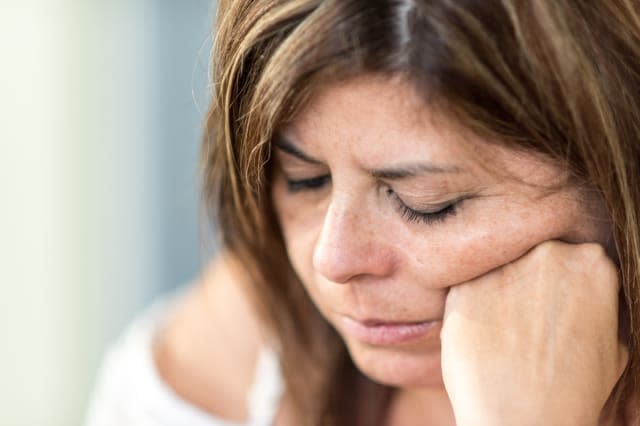Six surprising menopause symptoms

You know that the menopause can cause hot flushes, night sweats and bloating, but the fluctuating hormones experienced as a result of 'the change' can result in a host of other physical and psychological issues too. Here are seven menopausal symptoms that might surprise you.
See also: Night sweats: What causes them and what you can do
See also: Five ways the menopause affects your sex life
1. Depression, anxiety and mood swings
Oestrogen helps to increase the feel-good brain chemicals serotonin and dopamine, which are responsible for mood regulation. What happens when oestrogen levels dip in the menopause? Low mood, anxiety, and mood swings.
2. Forgetfulness
Forgetting things, problems concentrating, and being unable to find the right words are usually associated with dementia – but these are also common symptoms of the menopause. The drop in oestrogen can affect cognitive functioning, while other symptoms, such as poor sleep caused by night sweats, can make it hard to think straight.
The condition is known as nominal aphasia - a temporary state caused by receptors in the brain being deprived of oestrogen. Thankfully, the majority of women find that their memory goes back to normal once fluctuating oestrogen levels have settled.
3. Itchy skin
Oestrogen plays a key role in maintaining healthy skin, and is responsible for stimulating the production of collagen, a fibrous protein that provides elasticity and support to the skin and other tissues.
When oestrogen production drops during menopause, the result can be dry, itchy skin. Some women report a sensation of numbness, "pins and needles", tingling, and/or pricking of the skin - and a few unlucky women experience formication – a phantom sensation of insects crawling over their skin.
4. Menopausal arthritis
Oestrogen is known to have an anti-inflammatory effect in the body, and although the relationship between our joints and oestrogen is not fully understood, many experts believe that low levels of the hormone can lead to increased joint pain or trigger it for the first time.
A sudden reduction of oestrogen production, such as at the start of the menopause or due to hormone therapy, can trigger a rapid onset of arthritic symptoms – mainly affecting the joints in the fingers, according to a study published in the September 2005 issue of Arthritis & Rheumatism.
Known as menopausal arthritis, the condition is characterised by bony knobs visible on the fingers, with small lumps appearing on either side of the joint. For many women, the condition is temporary and will respond well to anti-inflammatory medication.
5. Bad breath
A drop in oestrogen doesn't just lead to vaginal dryness – a lack of moisture affects the entire body, including the mouth. When your mouth is dry, bacteria find it easier to flourish, resulting in bad breath. Women going through the change can also be more prone to tooth decay and bleeding gums.
6. Allergies
Hormones and the immune system are closely linked, and menopausal changes can lead to worsening allergy symptoms, or you may experience them for the first time. If you're going through the menopause and find that you suddenly develop asthma, hay fever or dermatitis, it could be 'the change' to blame.



